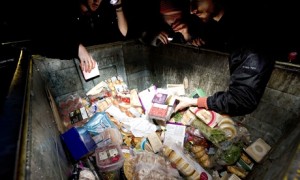Skipping: Is There Anything Wrong with Taking the Food That Supermarkets Throw Away?
CAPITALISM, 3 Feb 2014
Three men will appear in court for allegedly ‘dumpster diving’ – taking food from a supermarket dustbin. But isn’t the crime the vast amount of food being put into skips in the first place?

Freegans reclaiming food at night from bins outside a supermarket in Scotland Photograph: Murdo Macleod
In October, three men – Paul May, Jason Chan and William James – who live in a squat in north London were arrested and charged under the 1824 Vagrancy Act; they had allegedly been found taking some tomatoes, mushrooms, cheese and cakes from bins behind an Iceland supermarket. After a wave of criticism, including a series of tweets from Iceland’s chief executive, the CPS decided yesterday not to prosecute.
This isn’t the only case of someone being prosecuted for what is known as “skipping” in the UK and “dumpster diving” in the US – taking discarded supermarket waste, destined for landfill, from bins. In 2012, Sasha Hall, from Essex, received a conditional discharge after she admitted handling stolen goods after a friend delivered a bag of food thrown out by Tesco following a power cut.
“From the wider perspective of common-sense justice, I’m very clear that taking food out of the bin is a perfectly just thing to do and the injustice is that we waste a third of the world’s food supply while 1bn people go hungry,” says Tristram Stuart, author of Waste: Uncovering the Global Food Scandal and founder of the campaign group Feeding the 5000.
Stuart has been taking edible food from bins for years, and still does. “For me, taking food out of a bin has always been about demonstrating that injustice and the fact that supermarkets, despite years of campaigning, have not taken steps to avoid waste in the first place is appalling.” Last year, Tesco admitted it wasted 28,500 tonnes of food in the first six months of last year. Today, it was reported that Asda, Sainsbury’s, Morrisons, and other supermarkets including Waitrose, Marks & Spencer and the Co-op will regularly provide information on the amount of food they throw out. “There are perfectly viable channels for distributing food that you no longer want,” says Stuart. Organisations such as FareShare and FoodCycle were set up to tackle both waste and food poverty by redistributing edible food waste.
Skipping became the focus of media attention several years ago as part of the anti-consumerist “freegan” movement – people who, not necessarily out of financial necessity, search for free food, among other things – but Stuart says the vast majority of people he has always met around supermarket bins “were not people like me doing it as a moral statement or protest, but because they couldn’t afford to buy quality food. The fact that those supermarkets’ reaction to that has been to lock their bins and build cages around them, rather than not put food in there in the first place, is indicative of how callous the system is. It’s always been the case that the majority of people getting food out of bins are doing it because they can’t afford it.”
Go to Original – theguardian.com
DISCLAIMER: The statements, views and opinions expressed in pieces republished here are solely those of the authors and do not necessarily represent those of TMS. In accordance with title 17 U.S.C. section 107, this material is distributed without profit to those who have expressed a prior interest in receiving the included information for research and educational purposes. TMS has no affiliation whatsoever with the originator of this article nor is TMS endorsed or sponsored by the originator. “GO TO ORIGINAL” links are provided as a convenience to our readers and allow for verification of authenticity. However, as originating pages are often updated by their originating host sites, the versions posted may not match the versions our readers view when clicking the “GO TO ORIGINAL” links. This site contains copyrighted material the use of which has not always been specifically authorized by the copyright owner. We are making such material available in our efforts to advance understanding of environmental, political, human rights, economic, democracy, scientific, and social justice issues, etc. We believe this constitutes a ‘fair use’ of any such copyrighted material as provided for in section 107 of the US Copyright Law. In accordance with Title 17 U.S.C. Section 107, the material on this site is distributed without profit to those who have expressed a prior interest in receiving the included information for research and educational purposes. For more information go to: http://www.law.cornell.edu/uscode/17/107.shtml. If you wish to use copyrighted material from this site for purposes of your own that go beyond ‘fair use’, you must obtain permission from the copyright owner.